In 2020, Iran began shipping fuel to Venezuela, its closest ally in Latin America. Venezuela has the world’s largest oil reserves. But years of government mismanagement and U.S. sanctions on its oil industry have left its refineries in disrepair. Caracas faced gas shortages and widespread blackouts as a result. Iran provided refined oil to meet Venezuela’s transportation and consumer needs.
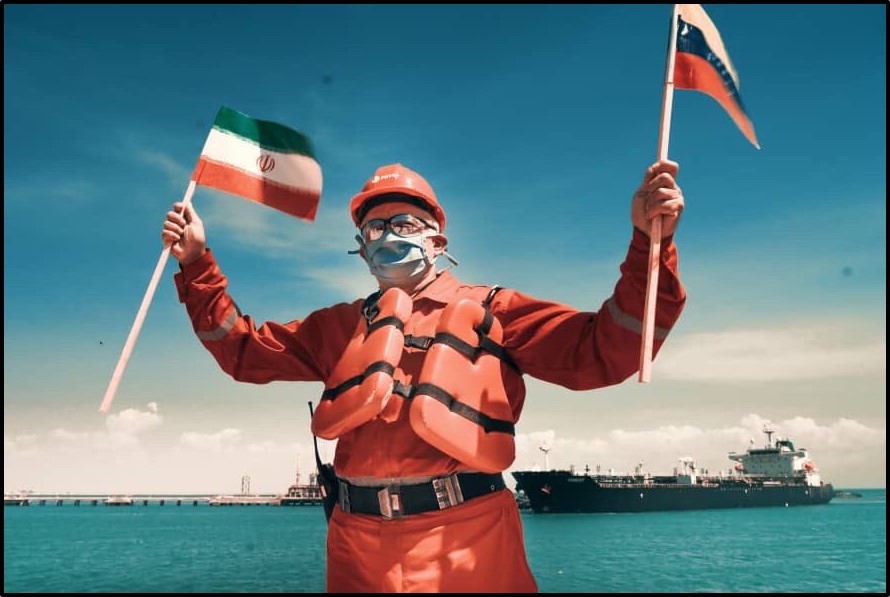
The first Iranian oil shipments sailed to Venezuela in May 2020. Five Iranian tankers – the Clavel, Faxon, Forest, Fortune and Petunia – departed from a refinery near Bandar Abbas on the Persian Gulf coast to deliver 1.53 million barrels of gasoline, worth more than $45 million, to Venezuela. The tankers were escorted by the Venezuelan military after entering the Caribbean. Between May 23 and June 2, the Clavel, Faxon, Forest, Fortune and Petunia arrived in Venezuelan ports and unloaded their fuel.
The U.S. Navy did not interfere with the fuel shipments. Instead, the Trump administration ramped up economic pressure on shipping companies and captains. June 24, the U.S. sanctioned the five ship captains who had delivered 1.5 million barrels of gasoline to Venezuela. In August, it threated the ship owners, insurers and captains of five tankers en route to Venezuela – Bella, Bering, Pandi and Luna – with sanctions, if they did not hand over their cargo. George Gialozologlou, the Greek owner of the ships, relented. On August 14, the United States seized the cargo -- 1.1 million barrels of gasoline.
But Iranian oil shipments to Venezuela continued despite U.S. sanctions. A three-ship flotilla carrying more than 1 million barrels of gasoline arrived in Venezuela at the end of September. Iran also began using disguised tankers to help Venezuela export its oil. The following is a timeline of Iran’s fuel shipments.
Related Material:
- Q&A: Iran and Venezuela
- Iran, Venezuela Increase Ties Amid U.S. Sanctions
- Zarif visits Latin America
Timeline of Iran’s Fuel Shipments to Venezuela
2020
April 23: Venezuela had received materials from Iran to help restart its Cardon refinery, which had stopped distilling oil in January, Caracas's Oil Ministry said. Iran had shipped catalysts, which are chemicals needed to refine oil into gasoline. Planes operated by Iran’s Mahan Air had reportedly conducted a series of flights from Tehran to an airport near the refinery.
April 30: Iran was accepting payment in gold in exchange for helping Venezuela rebuild it ailing oil industry, said Elliott Abrams, the U.S. Special Representative for Venezuela. Nine tons of gold, equal to about $500 million, had left Venezuela on Tehran-bound jets during the month of April, Bloomberg reported.
May 11: Hojattolah Soltani, Tehran’s ambassador to Caracas, denied that Iran was accepting gold from Venezuela as payment for oil products. “The governments of the two countries have held talks on bilateral trade cooperation, but so far Iranian fuel has not entered Venezuela,” he said.
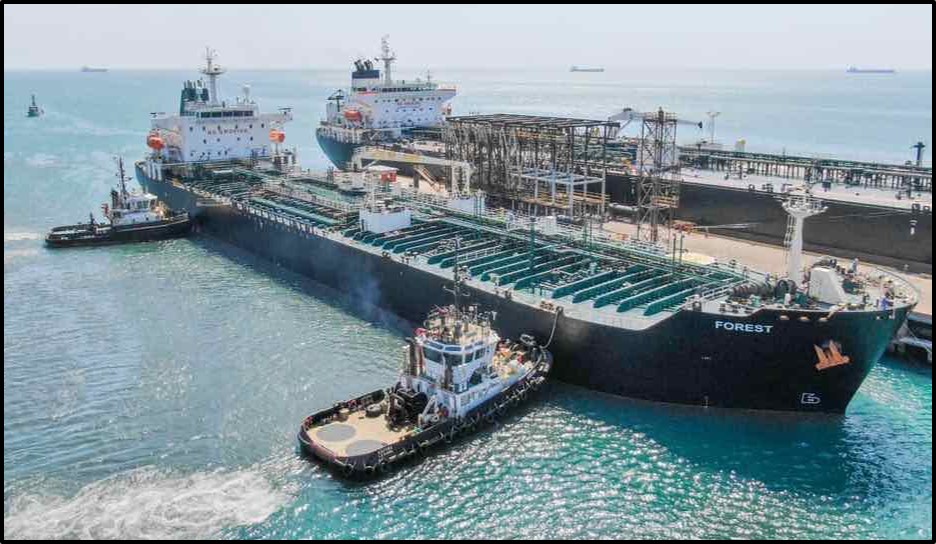
May 13: The Clavel, an Iran-flagged medium tanker, was en route to Venezuela after loading gasoline at Iran’s Bandar Abbas port at the end of March, Reuters reported. Four other Iran-flagged tankers were following the same path as the Clavel but had not listed their final destinations.
May 14: The United States was weighing options to respond to Iran’s fuel shipment to Venezuela. “It is not only unwelcome by the United States but it’s unwelcome by the region, and we’re looking at measures that can be taken,” a senior U.S. official told Reuters.
May 15: A news agency with ties to the Islamic Revolutionary Guard Corps (IRGC) threatened retaliation against any U.S. move to stop the fuel shipment. “If the United States, just like pirates, intends to create insecurity on international waterways, it would be taking a dangerous risk and that will certainly not go without repercussion,” Nour News Agency reported.
May 17: Five tankers belonging to Iranian state-owned or state-linked companies were transporting around 1.5 million barrels of gasoline, the AP reported. The gasoline, reportedly loaded from the Persian Gulf Star Refinery near Bandar Abbas, was worth at least $45.5 million. The Clavel had originally listed its destination as Caracas on May 12, but two days later it appeared as “TO ORDER.” Another tanker, the Forest, logged its destination as “S. AMERICA TO ORDER.” The Faxon, the Fortune and the Petunia had not listed destinations but appeared en route to Venezuela.
Iranian Foreign Minister Mohammad Javad Zarif warned against the United States “deploying its navy to the Caribbean in order to intervene and create disruption in [the] transfer of Iran's fuel to Venezuela.” In a letter to U.N. Secretary General Antonio Guterres, Zarif said that Iran “reserves its right to take all appropriate and necessary measures and decisive action ... to secure its legitimate rights and interests against such bullying policies and unlawful practices.” Iran summoned the Swiss ambassador in Tehran, who represents U.S. interests in the country, to communicate a “serious warning” not to interfere with its fuel shipment.
May 18: Iran threatened a “decisive response” if the United States targeted its oil tankers. “The U.S. itself will have to suffer the repercussions that arise out of any unthinking measure [that it could take] against the Iranian vessels,” foreign ministry spokesman Abbas Mousavi said during a press briefing. “Free trade between independent countries is a legal act. What is illegal is robbery in the sea.”
May 20: Military ships and planes would escort the five Iranian tankers once they entered Venezuelan waters, Defense Minister Vladimir Padrino said.
May 23: The Fortune, the first of the five Iranian tankers, arrived in Venezuelan waters. It was carrying around 11 million gallons of gasoline. “Iran and Venezuela have always supported each other in times of difficulty,” Venezuelan Foreign Minister Jorge Arreaza tweeted. “Today, the first ship with gasoline arrives for our people.” There were no reports of interference by U.S. warships deployed to the region. President Rouhani warned of retaliation if the United States interfered with the gasoline shipment. “We hope the Americans will not make a mistake,” he said.
May 25: The Fortune docked at a port connected to Venezuela’s El Palito refinery. Tareck El Aissami, Venezuela’s oil minister, called the Fortune “a symbol of the brotherhood and solidarity” between the two countries and thanked Iran for the fuel, additives and spare parts. The Forest, a second Iranian tanker, reached Venezuelan waters, state media reported.
May 27: The Forest docked at the country’s second-largest refinery, Cardon, in western Venezuela. The third Iranian tanker, the Petunia, arrived in Venezuelan waters. President Maduro said that he would announce a plan for distribution of the fuel in the coming days. “Now we will be able to go in phases toward a new normal in terms of gasoline supply,” Maduro said.
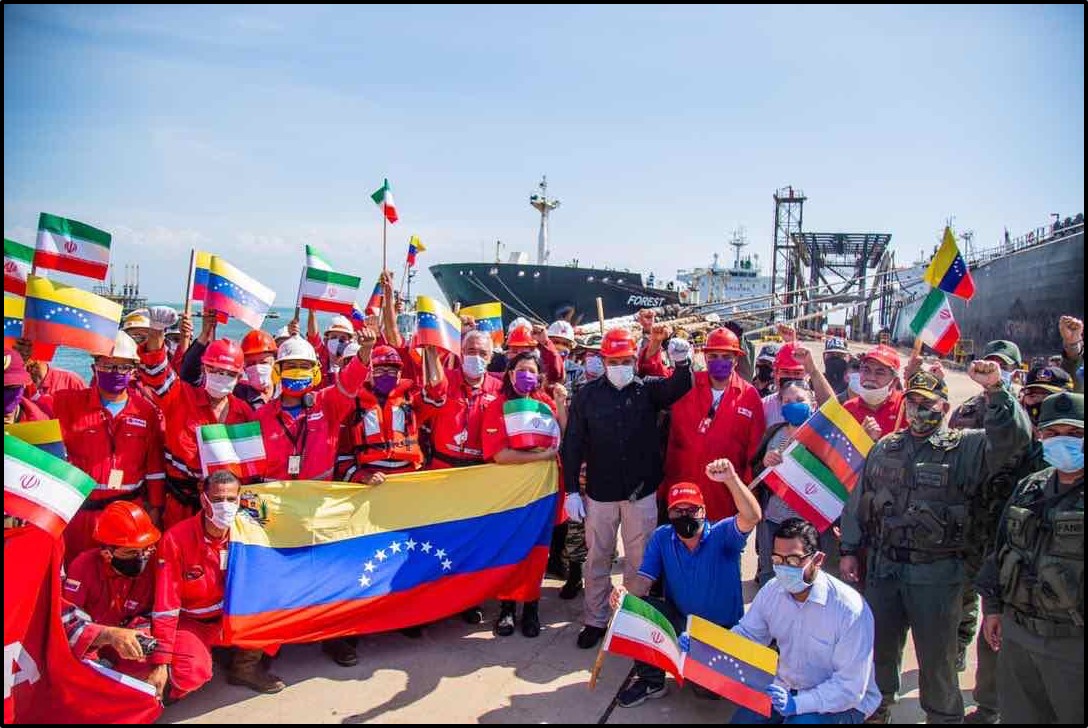
May 28: The Faxon, Iran's fourth tanker, docked at the Puerto la Cruz refinery on Venezuela’s eastern coast. Ali Shamkhani, secretary of Iran’s Supreme National Security Council, praised the crews of Iran's oil tankers as national heroes.
May 29: U.S. Special Representative to Venezuela Abrams warned that foreign countries and companies aiding Iran's fuel shipment to Venezuela could face U.S. sanctions. “We’ve alerted the shipping community around the world, ship owners, ship captains, ship insurers, and we’ve alerted ports along the way between Iran and Venezuela,” he told Reuters.
June 1: Iran was ready to ship additional fuel to Venezuela, Foreign Ministry spokesman Mousavi said.
June 2: The Clavel reached Venezuelan waters carrying 1.53 million barrels of gasoline. It was the last of five Iranian tankers convoying fuel to Venezuela.
June 3: Caracas would import additional gasoline from Iran, Venezuelan officials said. President Maduro said that he would visit Iran to sign a “high-level bilateral agreement strengthening energy, financial and military ties.”
June 8: Supreme Leader Ayatollah Ali Khamenei praised the crews of Iran's oil tankers that delivered fuel to Venezuela. “You did a great job. Your move was a jihadi one. You brought glory to the country,” he told the sailors.
June 10: General Hossein Salami, the IRGC commander, said that Iran had "imposed its will" on its enemies by shipping fuel to Venezuela. “By God’s grace, today we are witnessing the early and rapid decline of our archenemies, particularly the U.S.,” Salami said.
June 22: Iran had received payment from Venezuela for the shipment of fuel delivered by five Iranian tankers, Ali Aqamohammadi, a member of Iran's Expediency Council, said.
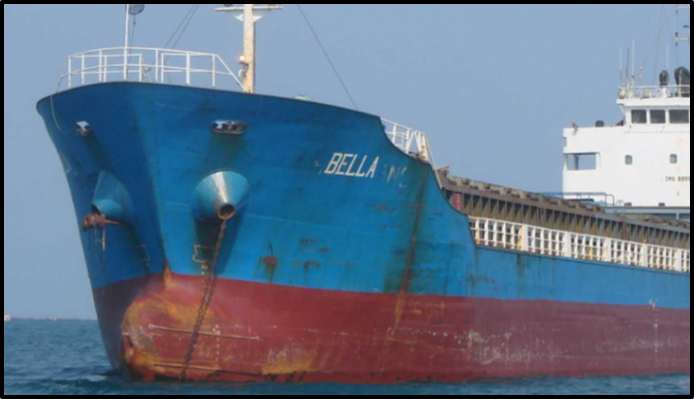
July 1: U.S. prosecutors filed a civil-forfeiture complaint to seize four Iranian tankers carrying gasoline to Venezuela in violation of U.S. sanctions. The prosecutors alleged that the tankers listed in the complaint — the Bella, Bering, Pandi and Luna — were transporting 1.1 million barrels of gasoline obtained using discrete ship-to-ship transfers. They also alleged that Mahmoud Madanipour, an Iranian businessman linked to the IRGC, helped facilitate the fuel sale by forging documents about the tankers and their cargo. “The profits from these activities support the IRGC’s full range of nefarious activities, including the proliferation of weapons of mass destruction and their means of delivery, support for terrorism, and a variety of human rights abuses, at home and abroad,” prosecutor Zia Faruqui said in the complaint.
August 14: The United States announced that it had seized the cargo of four oil tankers transporting 1.1 million barrels of gasoline to Venezuela.
The Bella, Bering, Pandi and Luna were reportedly en route to Houston after the United States threatened the ship owners, insurers and captains with sanctions if they did not hand over their cargo. “These actions represent the government’s largest-ever seizure of fuel shipments from Iran,” the Justice Department said in a statement.
September 28: A Iranian tanker, the Forest, entered Venezuelan waters carrying 272,000 of barrels of petroleum products. The tanker was the first of three oil-carrying vessels scheduled to arrive in Venezuela.
September 30: A second Iranian tanker, the Fortune, arrived in Venezuela. The vessel carried more than 300,000 barrels of fuel for Venezuela's state-run oil and gas company.
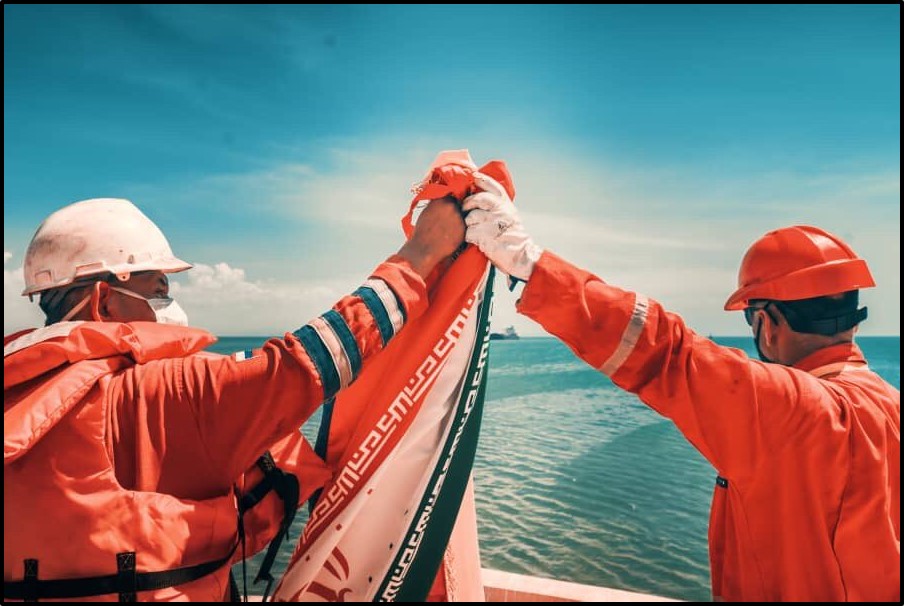
October 9: An Iranian-flagged oil tanker, the Master Honey, left Venezuela with 1.9 million barrels of heavy crude oil. The tanker was headed for the Persian Gulf, Reuters reported.
On October 29: the United States announced that it had sold and delivered the 1.1 million barrels of Iranian petroleum seized in August. The government sold the oil for about $40 million. It planned to deposit the funds into the U.S. Victims of State Sponsored Terrorism Fund. Saeed Khatibzadeh, the spokesperson for the foreign ministry, labelled the Trump administration "the Pirates of the Caribbean."
On December 4: Iran sent a new flotilla of 10 tankers to resupply Venezuela with oil. Abrams, the U.S. special representative for Iran and Venezuela, said that Washington is “watching what Iran is doing and making sure that other shippers, insurers, ship owners, ship captains realize they must stay away from that trade.”
On December 13: Iran used false call-signs to help Venezuela export its oil, Bloomberg reported. A vessel calling itself the Ndros loaded 1.9 million barrels of heavy crude oil from Venezuela for shipment to Asia. But the tanker was actually the Calliop, a ship chartered by the National Iranian Oil Company. The Ndros has been scrapped in 2018. Reuters reported.
2021
On January 7: The Golsan, an Iranian cargo ship, arrived in a Venezuelan port, Reuters reported. Its cargo was unknown, but the ship had previously delivered a shipment of food to Venezuela in July.
On February 10, the United States sold more than a million barrels of Iranian fuel seized from tankers headed to Venezuela, the Department of Justice (DOJ) said. “The petroleum has been seized, and an interlocutory sale has preserved the cash value of the petroleum, which is now held by the U.S. Marshals Service," a DOJ spokesperson told Reuters.
On February 23, Iran has been receiving jet fuel from Venezuela in exchange for its gasoline shipments, Reuters reported. Caracas had a surplus of jet fuel due to restrictions on domestic air travel. The fuel was transported on the same tankers Iran used to send gasoline to Venezuela.
Alex Yacoubian, a program assistant at the U.S. Institute of Peace, assembled this report. Andrew Hanna, a program specialist at the U.S. Institute of Peace, contributed.
Photos credits: Crew members celebrating via Venezuelan government, Crew member with flags and the Forest docking via Venezuelan government
